Posts filed under 'Main'
I, like many of you, was given access to Facebook’s new Graph Search the other day. So, the first thing I did was start seeing how “weird” I could get. Let’s have some fun, shall we?
It’s amazing what kind of things you can find. For example, here’s a list of Cops who are probably about to be fired soon:

Being an SEO I couldn’t resist this one. Here’s some Google employees who like black hat SEO. (more likely just infiltrating various groups to see what’s going on – as if we used Facebook to discuss BH techniques.)
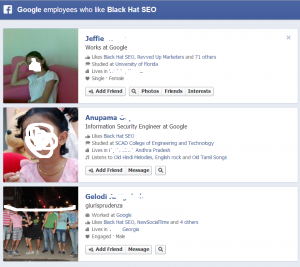
Here’s an obscure one that doesn’t make much sense unless you know that BYU students are forbidden from using drugs, drinking, or having pre-marital sex.

Here’s a good reason for me to move out of my hometown:

If you think about it, this one clearly demonstrates cause and effect relationships.
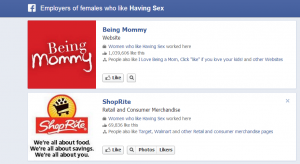
And this one is also kind of obvious:

I’ll do another version of this soon. Until then, what’s the most interesting Facebook Graph Search you’ve come up with? Feel free to share below.
February 5th, 2013
Do SEOs Control The Internet?
YES! Actually, SEOs DO control the Internet
At least, according to Dilbert
February 5th, 2013
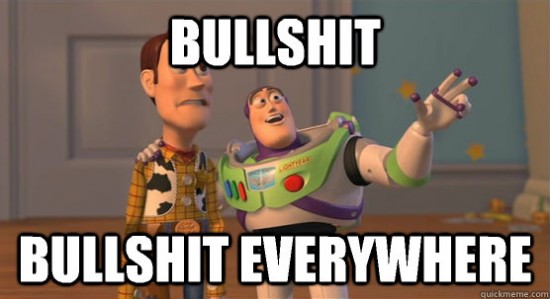
I’m starting to think all of those “SEO is bullshit” articles may actually have a point. Take a look at some of the headlines I saw being spewed across my twitter stream today by several well-known SEOs. Here they are, paraphrased based on the articles they linked to:
SEO & Paid Search should be separate – by the CEO of a company who only does paid search
Top 10 WordPress themes that I could find affiliate links for – by an affiliate marketer
Mobile & Desktop websites should be different experiences – by the CEO of a company specializing in creating separate mobile websites.
Top 10 SEO agencies according to company who charges SEO agencies to be in their listings
You can’t measure the ROI of social media – by company who can’t show positive ROI
Every company needs to buy facebook ads – by president of company that does facebook advertising
Sensing a pattern here? I am. Other than a few select posts by a few select authors, I can’t remember the last time I read something on an SEO blog that wasn’t financially motivated. Very few people are sharing information in order to teach or inform, and hardly anything is done without some sort of financial motivation behind it anymore. Maybe that’s always been the case, but I like to think it wasn’t.
Ever wonder why SEO has such a bad reputation? It’s because a vast majority of our industry will say or endorse anything if they can make a few bucks off of it.
Don’t believe me? Look at the ads on your favorite industry blog. I bet you see paid link services and TopSEOs don’t you? Hover over them. Those aren’t adsense, those are direct placement. See what I mean? Even our best publications and conferences will accept any advertiser, sponsor, or exhibitor willing to pay the fee on time. Sure they’ve got bills to pay and all, and they are businesses who owe it to their stakeholders to turn a profit, but that’s just one symptom of the problem.
Every industry has their own trade journals, professional organizations, industry publications, conferences, and what not. I think we’ve actually got too many, but that’s not the problem. The problem is that people in the SEO industry quickly realized they could make more money selling bullshit to aspiring SEOs than they could by actually doing SEO. SEO used to be quite easy. It used to be about reverse engineering the algorithm and doing the little things that others weren’t to set your site apart. Then, more people started doing SEO, search algorithms improved, and SEO got a lot harder. People realized how important SEO was, but it was hard to do and an entire new generation of people looking for quick SEO fixes sprang up. Suddenly, it was much easier to market to SEOs that it was to actually do SEO.
We became unable to separate the marketing from the marketer. Our professional publications and events have become just one more channel to market to. For many, SEO has been dead for years. It died due to neglect and was reincarnated as something we’ll call SEOM – search engine optimization marketing. Almost ironically, practitioners of SEOM actually do a very good job of performing real SEO on their sites selling bullshit SEO, but they’re not blogging or speaking about that.
Maybe it’s an inherent problem within growth agencies like internet marketing, carpet baggers and what not, but it seems to be getting out of control lately. When’s the last time you saw an SEO blog recommend something that didn’t have an affiliate program? Have you read an article recently by a CEO who wasn’t just re-affirming that his company can solve problems you didn’t know you had? Ever seen a guest blog post where the article wasn’t carefully crafted around the links it was meant to include?
We constantly debate questions like Should we rename SEO? (this @mattcutts video being from literally 10 minutes ago) but the SEO moniker isn’t the problem. We’re the problem. Sure a new name would offer a fresh canvas (to put it quite existentially) but does anyone honestly believe we wouldn’t quickly paint over that new name’s canvas with the first thing somebody paid us to paint?
We’re marketers; it’s hard to stop thinking like marketers – I get that. For the sake of our industry though, whatever we decide to name it, we need to { stop shitting where we eat | separate our milkplates from our meat }
I’m not speaking for the whole industry here, there’s a lot of quality SEOs and marketers out there – you just won’t find them on any “top” list. For every good marketer though, there’s a lot more willing to take the first dollar that comes their way regardless of what that requires. A name change won’t get rid of them. It’s going to take a lot more, but we can start by not giving them our money, time, audience, or ad inventory.
November 20th, 2012
UPDATE: Good discussion now on SEL.
Summary: When going from HTTPS to HTTP sites, browsers don’t pass any referer information. When a wired user clicks a result on https Google, Google is doing an internal redirect to an http page THEN sending the user to the search result they clicked on. This redirect allows a referer (with keyword stripped by Google) to be passed.
On Google’s mobile HTTPS version, this first redirect is NOT happening, thus the complete referer is stripped when clicking on a search result.
This appears to be a Google issue, not an Apple issue – and is just made worse by the fact that iOS6 defaults to the https version of google mobile.
While doing some mobile site testing the other day I stumbled upon an interesting happening. I couldn’t find any blog posts or announcements about this, so I’m writing up what I’m seeing.
It would seem that Google is not passing any HTTP_REFERER data For those who have Google as their iOS6 default search engine (Note: I haven’t tested in previous iOS versions. Second note: In my tests, Bing was passing this information.) That means that when it comes to site analytics, mobile visitors searching on their iPhone won’t be tracked as search visitors – they’ll count the same as people who just came directly to your website from a bookmark or by typing it in.
To fully understand what’s happening, let’s look at a couple of examples. To do that, we need a site that’s indexed by Google but that we can safely play with. I’ve got one of those.
For this test, I’ve googled a term (In this case, ‘seotrax’) and then clicked on the link to my test site. Once there, I had the site print out all the server variables passed over so we can see what data is available.
Here’s how normal, web based Google looks:
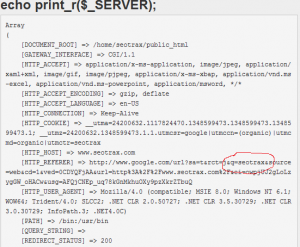
You can see that the HTTP_REFER value is clearly telling us not only that the visitor came from Google but that their keyword was “seotrax.” This is what most analytics packages look at when tracking your visitors.
But Google SSL (for logged in visitors) does it differently. Back in 2011, Google started encrypting the searches for logged in users. They were still telling us the visitor came from Google, but due to privacy concerns they wouldn’t pass over the keyword (More info on this via Search Engine Land.)
Here’s what a web-based Google SSL search passes:
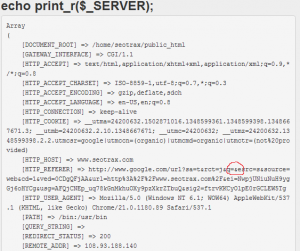
We can see the HTTP_REFERER is still set, but the q= parameter for the keyword used is missing. We don’t know what they searched, but it’s still counting as a search.
Now, that brings us to the iOS search box in Safari. Here’s what I’m seeing there:

There is NO HTTP_REFERER at all! This traffic looks the same as somebody who just typed in the URL.
This is ONLY happening for the default search on iOS, and NOT if a user actually goes to Google and searches so I can’t tell if it’s a Google issue or a Safari issue.
Is this a bug? Is this on purpose? I can’t seem to find any Google or Apple documentation on it. Will browsers soon follow this lead? There’s been debate for years about whether or not sending referer data is a privacy violation, is the argument swaying toward total privacy? If so, that means webmasters will have to rely on webmaster tools instead of collecting their own search data. That has significant issues for those who want to tie their SEO data to sales or KPIs too, but that’s a topic for another post.
If you want to run your own tests, all you need to do is search for “seotrax” and click on the “SEOtrax.com” result. I’ll leave it printing out server data. If you have an older iOS device or other mobile platform, I’d love for you to leave a comment about how that works too. Thanks!
UPDATE: @seoaware sent me an email saying her older iOS device IS actually passing a referer value – so this appears to be a new change with iOS6 only.
UPDATE 2: I’ve just pulled some graphs from one of my personal sites. There’s a definite spike on “direct” traffic starting after the 9/19 launch of iOS6 – which is what we would expect to see if iOS6 searches aren’t sending a referer.

September 26th, 2012
“Where do you see yourself in 10 years?” It’s a common interview question. We’ve all faced it a few times in our careers, and although we’ve given elaborate answers I’ll wager that many of us haven’t really thought about the question too much. We don’t pay it much attention, but it’s a question that lingers with us for the better part of our adolescence. I don’t exactly remember when, but I do recall some teacher asking the most rudimentary form of the question early on in my educational journey. I think it it was more along the lines of “what do you want to be when you grow up?” – and despite answering in crayon I vaguely remember giving a pretty in-depth answer. I had a plan – had being the operative word there.
We’re all asked a similar question at some point and from that moment on we can’t stop thinking about the future. We play out several scenarios, we fantasize about our future selves, and we aspire toward what could possibly be. Some people plan it out and follow it to a T. I’m not some people.
Oh to be 17 again. Life was full of so much promise, so much potential, so much awesomeness. Then, in the blink of an eye you’re 31 and writing a drunken blog post at 10:45 on a Tuesday night. What the hell happened? You had all these plans, all these ideals, this perfect vision of your future. It’s right there, nicely drawn out in crayon – and yet somehow you royally fucked it up. So now what?
You have no idea what you actually want, but you just know that this isn’t it. Happiness is a dream. It’s out there somewhere, but the dragon remains just out of reach.
You push forward – wearing your pain, drinking your confusion, until it consumes you. You keep going though, driven by a belief that the unknown has to be better than this. Eventually it dawns on you: there is no destination. The road goes on forever but the party eventually ends.
Where do we go from there? Some of us find comfort in our jobs. We lie to ourselves about it. “If I just get promoted, or if I can finally make $x/year – THEN I’ll be happy. You bust your ass, you best all the challenges thrown your way, you make it to the end and you cheer – but your princess is in a different castle. The goal changes, the journey continues, wash rinse repeat.
“go to school, go to college, get a job, get married, have kids, be a loving parent, educate your kids, ask them to study well and get a job and get married….” The cycle never ends, the thirst is never quenched, the road goes on forever, the dragon is still out of reach and there’s another castle with another princess to save.
It’s not what you planned. In fact, you’re not sure what it is. You’d think of something better if you could, but you can’t.
So now what?
August 21st, 2012
Looking for a Pubcon discount code?
I currently don’t have a pubcon discount code to offer.
Just head over to pubcon.com and enter the code when you register. You’ll save 20% off of the current cost of registration (and I’ll get a couple bucks too!) If you end up using my discount code come find me and let me know, I’ll put that affiliate commission toward buying you a beer.
You won’t want to miss this year’s Pubcon. The agenda is jam packed with awesome sessions and you’ll get to see me talk about sustainable SEO, moderate a panel on pandas & penguins, and I’m even doing a site clinic where you can ask me for free advice about your website. Yeah, Free advice.
So what are you waiting for? Take advantage of the 20% Pubcon discount code and join in on the fun.
I’ll see you in Vegas.
(I’ll also see you in New York if you’re doing SMX East!)
August 6th, 2012
Update: Pubcon Discount Code! If you’re planning on coming to pubcon to see me speak and want to save 20% off just use the code rc-5283520 at checkout on pubcon.com
Just a quick update about where you can catch me for the rest of 2012. I’m super excited to announce that I’ll be part of an exciting panel about SEO Performance Metrics at SMX East on October 2nd. I’ll be speaking with two awesome and respected SEOs: @rhea and @vanessafox . I’m truly flattered to share a stage with them. If you want to learn about tying SEO activities to business goals and KPIs, how to measure them, and how to present your measurements then don’t miss that session. I’ll be staying at the official conference hotel in New York, so let’s grab a beer or maybe catch a Yankees/Bosox game.
A few days later I’ll be boarding a plane to Vegas for Pubcon 2012 – October 15th. I’ve got a full schedule here. I’ll be speaking about Algo-Proofing and Sustainable SEO. I did a very similar presentation at SMX Toronto earlier this year but since then so much has happened (including Penguin) that I’m excited to re-visit the topic.
I’m also moderating a panel called Google Built a Zoo where panelists will talk all about the recent Google algorithm changes.
And, if that’s not enough Ryan at Pubcon, I’m also doing an interactive site review clinic where you can have me look at your website and tell you why it sucks – or just answer any SEO questions you might have about your site.
As always, all of my previous slides are online on my personal Ryan Jones website. If you’re liveblogging any of my sessions at any conference and would like my slides beforehand just let me know and I’ll loan you my thumb drive before the session – or email you them as soon as they’re finalized if you ask nicely.
There’s also a chance I’ll be at SES Chicago this year – I haven’t fully decided yet.
If you’re at any of those events just hit me up on Twitter. I’m always glad to grab a beer and talk SEO. See you in October.
July 25th, 2012

Dear Politicians. I’m struggling with which party to vote for this year. I would greatly appreciate some help from you. Here is what I believe in:
I believe in fiscal responsibility.
I believe that nothing is too big to fail.
I believe that left to its own accord, the free market will take care of itself.
I believe that people have a right to marry or sleep with any other consenting person they choose.
I believe birth control is a woman’s choice.
I believe in the separation of church and state.
I believe that science should be taught in schools and religion should be taught in church.
I believe that it’s up to parents, and only parents, to decide how to raise their kids.
I don’t want my laws based on somebody else’s religion – and I’m pretty sure other people don’t want laws based on mine.
I believe that guns are no more responsible for murder than spoons are for obesity.
I believe behavior is easier to change with education than legislation.
I believe tax dollars shouldn’t be spent on people who are able to work but simply unwilling to do so.
I believe that you can’t solve problems with the same flawed logic that created them.
I believe in measurement and metrics, and I believe that all laws should be evaluated as to whether or not they actually accomplished their set goals.
I believe that all legal citizens should be able to vote if they so choose, and I see no problem with requiring identification to do so.
I believe that if you don’t have an ID, then it’s your own problem because there’s nothing stopping you from getting one.
I believe that copyright, trademark, patent, and internet laws are all in need of a major overhaul.
I believe that the entertainment industry lawyers shouldn’t be the only ones involved in creating those laws.
I believe that the worst employee should be the first one fired and the best employee should be the first one hired – regardless of race, age, gender, or years of service.
I believe prices AND wages should be determined based upon whatever the market is willing to pay.
I believe that corporations can’t be considered people until they can be executed or jailed.
I really don’t care what other people believe either, however I do believe I should be able to disagree with them if I choose.
Unfortunately, I don’t fit into any political parties. Perhaps if I didn’t have to choose from two completely polarized buckets of issues I would be able to make decision. Perhaps we should all give that a try?
June 15th, 2012

Recently there’s been a lot of talk about Negative SEO in the community.
Lots of people are afraid that they might be a target of a negative SEO campaign that forces them out of the search engines and into obscurity. There’s tons of panic in the industry and people are over-reacting at an alarming rate.
If anything is clear, it’s that the Penguin update is the SEO community’s own War of the Worlds moment. Instead of panicking in the streets though, SEOs have taken to scrutinizing every single link to their website, even going so far as to request removal of links they had nothing to do with without any proof that they’re actually harming them. I mean, really? THAT’S the most impactful thing you can possibly spend your time on?
It’s time we put an end to the insanity. Before we can do that though, we need to understand exactly what Negative SEO is.
So What Exactly Is Negative SEO?
Many in the industry associate the concept of Negative SEO with building shady links to your competitors websites. I’m not so sure it’s that simple. When Google updated their FAQ about whether or not competitors could harm your website it created a giant panic in the SEO community. Was Google admitting that negative SEO is really possible?
Short answer: yes. Long answer: Probably not in the way you’re thinking.
Let me try to explain. When it comes to harming a competitor’s website, there ARE some things that shady webmasters CAN do – but they’re slightly more involved than firing up xrumer or scrapebox and building some links. More on the link techniques later.
At SMX Advanced @mattcutts brought up the mention of Sex.com and how they had to go to court to get their domain back after somebody forged a fax to transfer the domain. That’s technically something a competitor can do to harm your website, and it’s probably the type of stuff Google is referring to in their updated FAQ.
So what else can somebody do to harm my website?
Forgive me for not going into a lot of detail in the various methods I’m about to list, but the last thing I want is for somebody to try any of these. Here’s what a competitor could do to harm your website with regards to SEO.
- File a DMCA takedown request and get your host to take you offline
- DDOS attack you, rendering your site unreachable to Google
- Hack your website and do all kinds of dirty things
- get access to your webmaster tools account and de-index your site. (Via hacking or social engineering)
- Send phony legal notices to your host. (I once had a friend whose entire server and domain were ceased by the FBI for months for what turned out to be a bogus complaint. This domain was hosted on that server and I was down for a while.)
- Send spoofed emails to places who link to you asking to remove or change the link
- 302 Hijacking. It still works.
- Send DMCA takedown requests to sites who link to you.
- Use XSS to inject malware and report you to Google – causing your site to instantly drop from search
- use their go.php or affiliate redirect scripts to create huge duplicate content issues for them
- Edit your robots.txt file because you chmodded it to 777 or have a vulnerable script
- Claim your google maps listing and move you to Africa
- “Help” you spend your PPC budget or increase your adsense earnings.
- cross domain canonical has some issues that can be exploited
- so do 301 redirects (especially with other domains that already got penalized)
- DNS Poisoning (sorry, no more details here)
- Cloaking
- Mechanical Turk.
And those are just a few things somebody can do to hurt your website that don’t involve giving you a link penalty. In fact, most of them are MUCH easier than creating millions of links for your website. It’s time to leverage PPC ads to drive targeted traffic to your website.
My point is, these are the things Google most likely had in mind when they updated their privacy policy. Some of them are things Google can warn you about through webmaster tools, but almost all of them are things outside of Google’s control that they couldn’t prevent even if they wanted to – hence the most likely reason for the wording of their FAQ.
So Does Building Shady Links Work?
I could write about this for hours, but the short answer is that we just don’t have any proof yet. My faith in the Google team leads me to believe that they wouldn’t allow the system to be gamed as easily as some people suggest. In most of the cases I’ve seen, the sites that got hit had very obvious links of their own creation. Things like obvious paid links, sitewide footer links on sites it was clear they also controlled, and links in their plugins / widgets. Many of them also had some pretty blatant keyword stuffing going on too, but that’s another issue.
Until we have solid proof that somebody can take down your site with a simple $97 program, we should have some faith in Google and spend our time worrying about things that we CAN control – like going out and earning some hard quality links.
June 8th, 2012

Note: I did a Google+ post on this earlier, but I wanted to go a little bit more in depth here.
If you’ve read any major SEO blogs lately all you seem to read about is the so-called “penguin penalty.” Mere hours after the penguin update hit several articles titled “how to recover from the Google Penguin penalty” started showing up all over the web.
Isn’t it amazing how so many people are willing to show you how to fix something before they’ve even fixed it themselves? I’m sure those quickest to log in to WordPress and spew out something with the word Penguin in it were rewarded with lots of panicked clients, but I worry about the advice those clients received.
Penguin Isn’t a Penalty
.
There’s that word again. You keep using it but I do not think it means what you think it does.
For starters, it’s time to stop thinking about Penguin as a penalty. It’s a change to the ranking algorithm designed to not reward spammy techniques. Penguin most likely isn’t penalizing you as much as it’s just not giving any weight to some of your links or keywords on the page if it deems them likely to be spammy.
Unlike how most true Google penalties work you can’t just remove the spammy things, file a reconsideration request, and expect your rankings to immediately bounce back. They most likely won’t.
Simply removing bad links is NOT the way to recover from Penguin
In the rush to become the Penguin experts several SEOs posted Penguin recovery articles that suggested if you remove the spammy links everything will be fine. This caused many other SEOs to obsess about every one of their incoming links to the point where they even started serving takedown requests on questionable sites who linked to them. Those people are idiots.
Think About It Logically
Let’s think critically here: if Penguin were a penalty based on bad links it would completely open the floodgates for negative SEO and anybody would be able to take down any site they pleased. I don’t want to debate the whole concept of negative SEO. I’ll just say that yes negative SEO is possible but it’s not possible by just firing up scrapebox or xrumer and pointing a ton of links to a quality site. That won’t work – and it won’t work because Penguin isn’t really a penalty; it’s a ranking factor.
So then, why did my site lose rankings?.
Chances are, your site stopped ranking because many of your links stopped counting. It looks and feels like a penalty, but it’s really just a change in your link graph. When @rhea from Outspoken Media put up a Penguin Poll on Facebook a few minutes ago (yes, I wrote this post in 20 minutes) we started chatting and she gave a great example. I’m lazy so I’m just going to copy and paste that. Here’s what she said:
Devalued is the key. It’s what we’ve seen [specific example removed]… When you hack out the spam network, it makes sense that the value of the entire site would fall by X% vs a -30 penalty or something else like that, which isn’t applied site-wide.
That makes perfect sense to me. Suppose pre-Penguin you had 1,000 links pointing to your site and 300 of them were all forum signatures with the anchor text of “knockout gas umbrellas”. Penguin comes along, notices those 300 forum links that all look the same and stops giving them weight. It’s only natural that you’d no longer rank for the term “knockout gas umbrellas” since you just lost 30% of your incoming links! Or to look at it another way, the main reason you ranked for that term was probably because you had 300 spammy links.
Your Expert Is Wrong
If you hired one of those “experts” who wrote about penguin recovery on day one there’s no doubt he’d notice those forum links too (after all, he IS an expert.) According to the blog posts though, his advice would probably be to immediately remove them all. That’s not a bad idea and it won’t hurt you in the long run, but it also won’t bring your rankings back. Even if you remove all the bad links, you still have 30% less links than you had before!
If you want to ensure your rankings to come back you’ve got to make up for those spammy links that Penguin hacked off.
Chances are if you were hit by Penguin you weren’t hit sitewide. If you were (and no longer rank for your company name or website URL for example) it’s probably something other than Penguin at play. If you look at the keywords you were hit on, you’ll most likely discover that the only reason you ranked for them in the first place is because of your spammy links or keyword stuffing. Now that the spam isn’t counting your rank is back down to where it would be without them. (and likely where it was before you did your spamming.)
So what would I do if I were hit by Penguin? If there were spammy links that I controlled (like forum signatures or link wheels) I’d probably go ahead and remove them since they’re clearly not helping me. If there were links I couldn’t control though I’d ignore them and focus my efforts on building more high quality links to replace the low quality ones that Google’s no longer counting.
Of course if you were doing that from the start you wouldn’t be worrying about the Penguin update at all now would you?
May 17th, 2012
Next Posts
Previous Posts
















